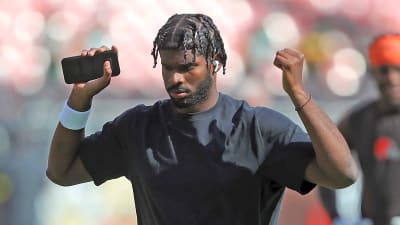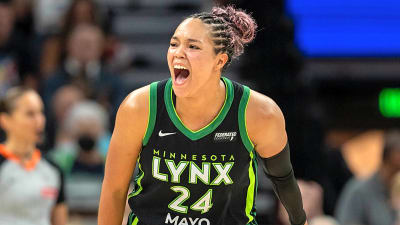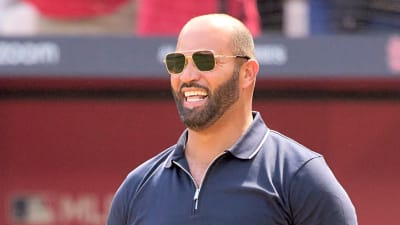
It feels like Aaron Glenn has said all the right things to heal the New York Jets’ ailments. And it’s not as if Glenn has merely talked – he’s backed up his words with concerted actions.
After two seasons in which the Jets struggled with penalties and missed tackles under Robert Saleh, Glenn honed in on those areas in training camp. He had the Jets running live tackling drills, and when players committed foolish penalties in practice or the preseason, they were reprimanded.
Yet, four games into Glenn’s debut season as a head coach, the results have not changed. The Jets are still losing football games because of fundamentals that are drilled into players’ brains from their first pee-wee practice, whether it’s pre-snap penalties, fumbles, or missed tackles.
Glenn isn’t turning a blind eye to the Jets’ woes. The former Pro Bowl cornerback gets on the podium after each loss and acknowledges the team’s shortcomings, promising to get them fixed.
It is evident that Glenn is cognizant of his players’ weaknesses, and that he does not approach them with a complacent mindset. Glenn seems committed to emphasizing those issues in practice, rather than patting his players on the back and assuming things will naturally improve. After last night’s loss to the lowly Miami Dolphins, media members reportedly heard Glenn screaming at his team through the walls.
Despite Glenn seemingly doing everything in his power to correct New York’s problems, the Jets continue to put out a losing product on a weekly basis. So far, nothing Glenn has said since he was hired in January has translated to the football field.
It leaves New York staring at a daunting cloud that has hung over the Glenn hiring since it was announced: Can this type of coach succeed in the modern NFL?
Mired in a culture of losing after a decade-plus of embarrassing football, the Jets craved a “CEO” type of head coach in the 2025 cycle – someone who could restore an essence of toughness to an organization that had become a laughingstock. It was clear that this type of coach was their priority based on Glenn and Mike Vrabel being their top targets.
This was a direct response to the Jets’ previous failed coaches.
Robert Saleh developed a reputation for being too player-friendly. It led to a culture that lacked discipline and standards. Prior to Saleh, the Jets were led by Adam Gase, who was hired for his schematic acumen despite apparently lacking leadership traits. Gase’s team embodied his emotionless demeanor, showing little toughness or mental fortitude.
So, the Jets were drawn to Glenn, a natural-born leader who clearly had the chops to command the respect of a locker room. Through his success as a player, scout, assistant coach, and defensive coordinator, Glenn had built a reputation as a man players would get behind.
He has lived up to that reputation. Through four games, the Jets’ hustle and toughness under Glenn cannot be questioned. While the team is 0-4, it is not for a lack of energy or competitive fire. The tape shows very few examples of players giving poor effort. If anything, the Jets play too hard, as they often overrun plays or make a mistake by trying to do too much.
But that dilemma brings us to one of the main concerns surrounding Glenn’s potential as a head coach: It does not matter what he says to his players or how loudly he says it. No amount of yelling or screaming will magically force players to play better.
From Bill Belichick to Andy Reid, NFL history is littered with successful head coaches who did not need creative metaphors or rah-rah speeches to fill their display cabinets with hardware. That’s because winning football games isn’t about playing the hardest.
It’s about skill and tactics.
There is somewhat of an irony in that statement. Football is known as one of the most brutal team sports in the world. To the naked eye, it looks like 11 one-on-one matchups between two world-class athletes trying to push the other onto the ground.
Naturally, the sport’s physical nature creates the notion that the winning side is usually the one who “plays harder” or “wants it more” – pick whichever cliche you like.
Perhaps that was true in the NFL many moons ago, and it could still ring true at amateur levels of the sport. But in today’s NFL, where every player is a world-class athlete with a highly trained skill set and millions of dollars on the line, the gap in talent and effort between two teams is rarely significant.
Skill and tactics are what set the haves apart from the have-nots in the modern NFL. To gain an edge over another group of guys who are just as athletic, rich, and motivated, you need to out-execute them. That comes down to two things: the players’ technique and the coaches’ planning.
On the players’ side, the reality is that the Jets have many players who aren’t technically proficient. That isn’t entirely Glenn’s fault (although he has major say in the roster), and the Jets must wait until the offseason to rectify their talent-centric issues.
Still, it’s on Glenn and the coaching staff to enforce better team-wide technique in areas like gap discipline, tackling angles, ball security, and pre-snap alignment penalties. In many areas, New York displays poor technique as a collective unit, and it often includes accomplished players who were more productive in the past.
As it pertains to Glenn’s planning, the question is this: Can Glenn consistently oversee a prudent strategy that gives his team an edge over coaches like Mike McDaniel, Todd Bowles, Sean McDermott, and Mike Tomlin?
It’s too early to answer that question with a yes or no. But as time goes by and the “culture” aspect of Glenn’s coaching progressively loses value, the spotlight on his abilities as a strategist will only grow brighter.
The main appeal of hiring Glenn was supposed to be his talent as a culture-setter. But we are learning very quickly that Glenn cannot change the Jets’ fundamental issues through his words alone. Being a passionate, charismatic wordsmith is not making the Jets tackle better or convert more third downs.
A head coach can only truly affect his team’s performance through strategy. Between game planning during the week and adjustments during the game, the head coach’s most direct impact on team success comes down to the positions he puts his players in.
To reiterate, it is much too early to claim that Glenn is incapable of being a great strategist. His resume suggests that he could very well be an excellent coach in that area. He spent the last four years absorbing the Detroit Lions’ forward-thinking approach on both sides of the ball. Before that, he learned under Sean Payton in New Orleans as Drew Brees continued to push the game forward offensively.
At some point, though, if Glenn is to prove himself as “the guy” in New York, his team needs to show proficiency from a strategic standpoint. Clearly, Glenn isn’t enough of a motivator to make his players stop missing tackles or committing penalties – nobody is. So, he must create advantages for his players through the collective scheme and philosophy.
In the 2025 hiring cycle, multiple head coaches were hired from the “strategic” end of the spectrum, highlighted by Liam Coen (Jacksonville) and Ben Johnson (Chicago). So far, Coen and Johnson have earned a combined 5-3 record with teams that went a combined 9-25 in 2024.
Coen and Johnson were successful offensive coordinators at their previous stops. Hiring the hotshot offensive coordinator is a popular trend in the NFL, and many believe that hiring an offensive play-calling head coach is the best (or only) way to go in today’s league.
There is credence to the idea of favoring offense. However, focusing on a coach’s background (offense or defense) distracts from the real key to success: strategic acumen.
It ultimately does not matter which side of the ball a head coach came from. Offensive coaches have to know defensive schemes to call a good offense, and vice versa. Every coach knows both sides of the ball, so the true separating factor is a coach’s skill in two areas: instilling the best possible schemes for the players at their disposal, and beating the opposing coach in the chess match each week.
Glenn, despite his defensive background, could still end up being the type of strategist who can position his team for success in the highly tactical modern NFL. The sustained success of head coaches like Sean McDermott, John Harbaugh, Mike Tomlin, Dan Quinn, and Dan Campbell proves that you do not have to be the latest wunderkind offensive play-caller to be a successful head coach.
What sets the aforementioned names apart is their ability to set an advantageous strategy for their team on a weekly basis, through a combination of scheme, philosophy, and weekly adjustments to the opponent (both in game-planning and in-game adjustments). Their success is not due to having the most inspiring quotes or getting their players to run through the thickest of brick walls, even if Campbell, Glenn’s former mentor, excels in those two categories.
After just four games, it is too early to write off Glenn’s chances of being the man who can turn around the Jets. What we can do, though, is write off the idea that his charisma is enough to stomp out any of the Jets’ on-field issues.
Nothing Glenn says at the podium, in the locker room, or on the practice field will change the live-game results. Only his strategic decisions can alter the Jets’ fortunes, and that is the sole facet where Glenn must be evaluated going forward as we attempt to deduce his chances of being the right man for the job.
More must-reads:
- Shedeur Sanders going 'full mime' shows that concerns about him are valid
- Veteran wideout announces retirement from NFL
- The 'Active multiple 140-receiving-yard games' quiz
Breaking News
Trending News
Customize Your Newsletter
 +
+
Get the latest news and rumors, customized to your favorite sports and teams. Emailed daily. Always free!








